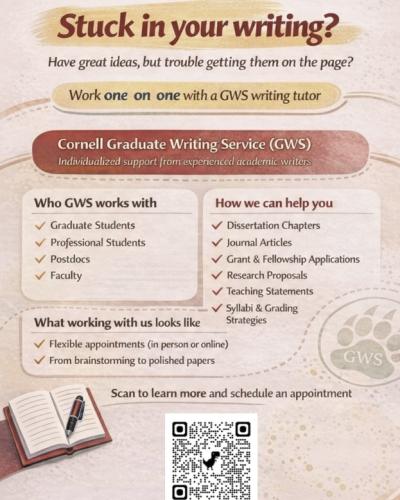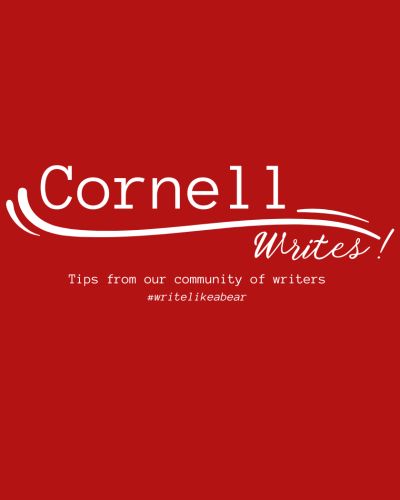Cornell Writes! Tips from our community of writers is a digital newsletter sponsored by the Knight Institute for Writing in the Disciplines and the Cornell University Graduate School.
Each week, a member of our writing community – a Graduate Writing Service, English Language Support Office, or Cornell Writing Centers tutor; a writing specialist from the Knight Institute; a writing instructor from our First-Year Writing Seminars or Writing in the Majors programs; maybe YOU – will share a writing strategy from their own writer’s toolkit. #writelikeabear
Contact Tracy Hamler Carrick with questions and ideas.
Meet Paige Chung
Paige Chung is a writer and DJ. They currently research hip-hop and DJ turntablism. They write poetry, plays, and essays. Born x Raised in Los Angeles but they roll everywhere. They currently train in DJ turntablism at the Beat Junkies Institute of Sound and study Performing and Media Arts at Cornell University.
Here is this week’s Writing Tip!
Sometimes I get anxious or nervous when I am about to start writing. Stress to do well and impress the audience or the professor. Doubts of whether I am a good enough writer to pull off an idea I want to execute. Regardless, when I get a bit emotional, I take a deep breath and I approach the page with three strategies.
- Write like my best friend is listening to my latest tea and wants to know every word. What were they wearing? Who is that again, the one from your math class? How dare she!!! Sounds silly, but whenever I am talking to my best friend, I am welcomed with love, curiosity, and a genuine desire to know every detail of my story. So when I am stuck, I write like she is listening. This can apply to any kind of writing, I am a scholar like you writing papers for my professors too.
- Breakdown what I need to write like instructions to build a shelf. 1-2 sentences describing the performance. 3 sentences about the theoretical framework and why it is related to this performance. 6 sentences about the musical structure of the party. 4 sentences about the……….I don't always know exactly what I need to write next, which is sometimes where the anxiety rolls in. However, planning this way anticipates what I might need to say and how much. It's an art not a science, so it is only an approximation. But when I can see an outline like this, I think I only need to write one sentence at a time. Then I build and build and build. This structure can always change later.
- Cut with a knife. My mentor Dr. G gave me this one. When you are editing, NOT WRITING, cut with a knife meaning go through each of your sentences and cut any words that you do not need to make the point you need to make. If you already made the point, why make it again? We are going for expansion, concision, potency: expand the idea from another perspective, say it simple and say it clean. No need for repetitiveness, unless that's what you're going for, in that case you know what you are doing. Cue O.T. Genasis: Cut it, cut it, cut it -- you need to cuuuuuuut it.
Now, get to it.





